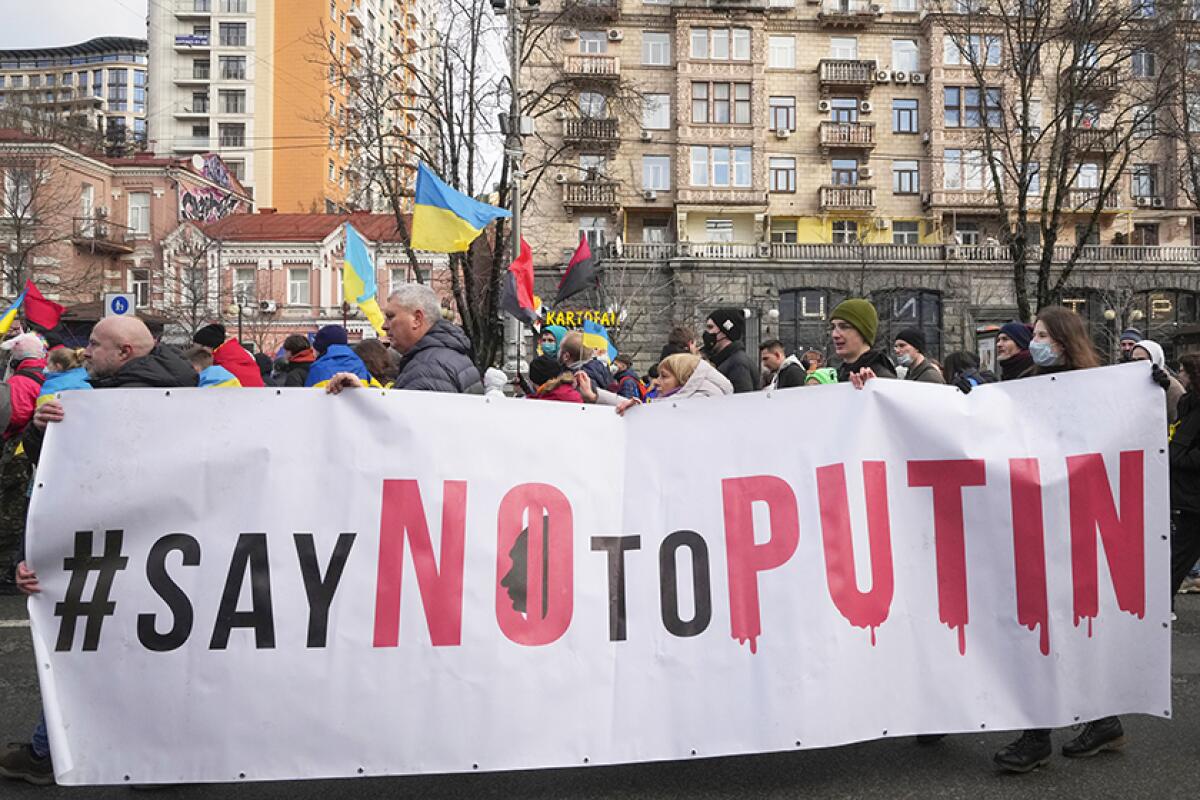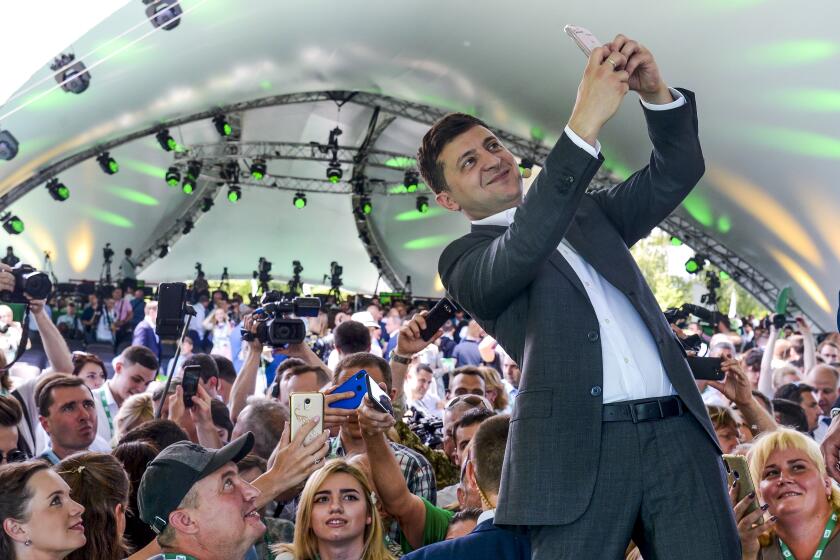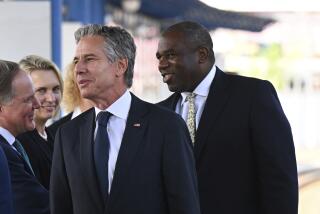U.S. relocating embassy from Ukraine’s capital amid fears of Russian invasion

- Share via
WASHINGTON — Warning of “dramatic acceleration in the buildup of Russian forces” on Ukraine’s border, the U.S. on Monday announced it was closing its embassy in the capital city of Kyiv out of fear for the safety of its diplomats.
Meanwhile, Ukrainian President Volodymyr Zelensky said he’d been told that Russia would invade on Wednesday, a quip his office later said was meant sarcastically, reflecting what some in Kyiv think is a breathlessness on the part of members of the Biden administration who have warned of an imminent Russian attack.
Washington and most European capitals, as evidence of a looming invasion, point to Moscow’s amassing of more than 130,000 troops on its border with Ukraine and in its ally, Belarus, which sits on Ukraine’s northern border, just a two-hour drive from Kyiv. There is disagreement, however, on how soon such an action might take place.
The White House and State Department reiterated the U.S. contention that Russia has shown no evidence of de-escalating, as NATO members are demanding.
“What we are seeing on the ground with our own eyes [indicates] it could begin at any time,” State Department spokesman Ned Price said.
As a consequence, the State Department, which had already begun withdrawing personnel from the besieged former Soviet republic, said it was “relocating” all embassy functions to Lviv, a city hundreds of miles west of Kyiv near the border with Poland.
“I have ordered these measures for one reason — the safety of our staff — and we strongly urge any remaining U.S. citizens in Ukraine to leave the country immediately,” said Secretary of State Antony J. Blinken.
He said the embassy in Lviv would “remain engaged with the Ukrainian government” including intense efforts to de-escalate the crisis, despite the distance from Ukraine’s seat of government.
Price said the top U.S. diplomat in the country, Kristina Kvien, was already in Lviv, along with a “vast majority” of the reduced core staff remaining in the country. In Kyiv, there were reports of departing officials destroying computers and the building going dark.
U.S. officials have forecast an invasion that would be “multi-pronged” and overwhelming, including cybersabotage that would shut down much of the country’s institutions and power grids, followed by airstrikes and overland troop movement.
That has raised questions about whether the move to Lviv really made diplomats safer or was meant as a face-saving gesture to show the U.S. had not completely abandoned the country. Price rejected that explanation, saying it was “a matter of geography.” The move to the west puts the Americans farther from Russian troops and would allow escape through NATO member Poland.
“The threat is very real,” Price said. Closing the embassy “does not signal any diminution on our part for the territorial integrity and sovereignty ... of Ukraine, quite the contrary.”
The orders for U.S. citizens to leave Ukraine have rankled Ukrainian officials who fear panic will ensue. The Biden administration, for its part, is keen to avoid anything similar to the disastrous evacuation of Afghanistan last year, when hundreds of Americans who declined to leave on their own accord were stranded, at least temporarily, after U.S. forces withdrew to end two decades of war.
Despite its massive troop deployment, Russia has denied plans it intends to attack. On Monday, Moscow signaled it was open to continued talks with Western governments about its security demands. Many of those demands, including one that seeks to bar Ukraine from joining NATO, have been rejected by the U.S. and its European allies.
President Biden spoke to Russian President Vladimir Putin on Saturday, and the U.S. has engaged in multiple rounds of diplomacy to try to defuse the crisis. Blinken spoke Monday for the second time in three days with his Ukrainian counterpart, Foreign Minister Dmytro Kuleba.
Some Ukrainians are starting to wonder whether their neophyte leader has the smarts and strength to lead them through a moment of peril.
“Our commitment to Ukraine’s sovereignty and territorial integrity is unwavering. We also continue our sincere efforts to reach a diplomatic solution, and we remain engaged with the Russian government following President Biden’s call with President Putin and my discussion with Foreign Minister Lavrov,” Blinken said in a statement. “The path for diplomacy remains available if Russia chooses to engage in good faith. We look forward to returning our staff to the embassy as soon as conditions permit.”
Defense Secretary Lloyd J. Austin III is heading to Europe on Tuesday to meet with U.S. allies in Belgium, Poland and Lithuania and discuss Russia’s military buildup, according to the Pentagon.
Pentagon spokesman John Kirby said “it is entirely possible that [Putin] can move with little to no warning,” but that Washington doesn’t believe the Russian president has made a decision. Kirby reiterated Biden’s message that an invasion would be met with swift and severe economic and diplomatic consequences.
European leaders were also busy Monday trying to prevent war. German Chancellor Olaf Scholz met in Ukraine with Zelensky before heading to Moscow for talks with Putin.
“There are no sensible reasons for such a military deployment,” Scholz said, in urging Russia to de-escalate. “No one should doubt the determination and preparedness of the EU, NATO, Germany and the United States.”
At the White House, officials continued to urge Putin to “engage constructively” while working with European countries to ensure energy supplies, including natural gas markets, and to mitigate price shocks — all of which could suffer if the West imposes tough financial sanctions on Moscow.
“All tools are on the table,” White House spokeswoman Karine Jean-Pierre said.
U.S. lawmakers, meanwhile, emerged grim-faced from closed-door briefings with White House national security officials.
“Time is running out for diplomacy,” Rep. Michael McCaul (R-Texas), the ranking member of the House Foreign Affairs Committee, told reporters.
Times staff writers Anumita Kaur and Noah Bierman in Washington contributed to this report.
More to Read
Get the L.A. Times Politics newsletter
Deeply reported insights into legislation, politics and policy from Sacramento, Washington and beyond. In your inbox three times per week.
You may occasionally receive promotional content from the Los Angeles Times.










